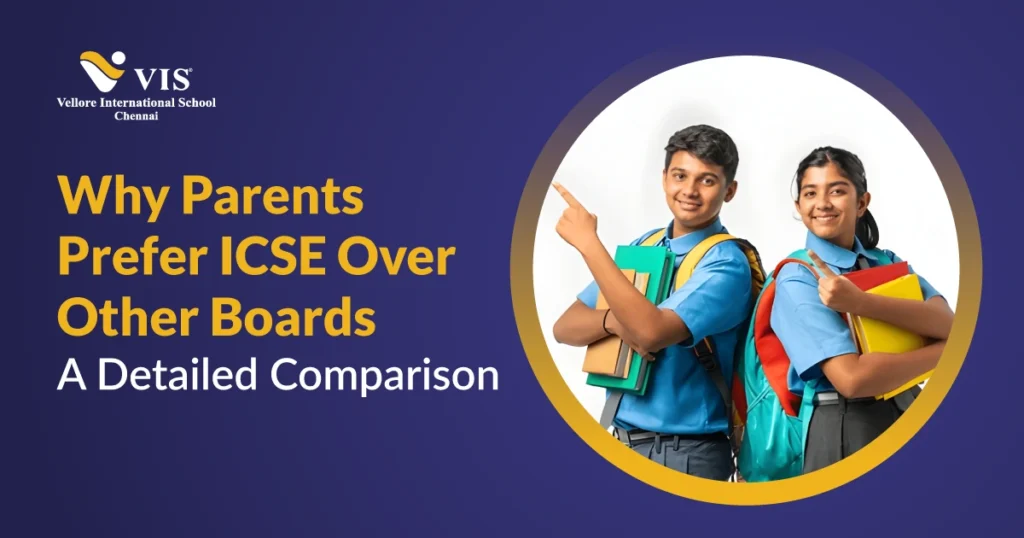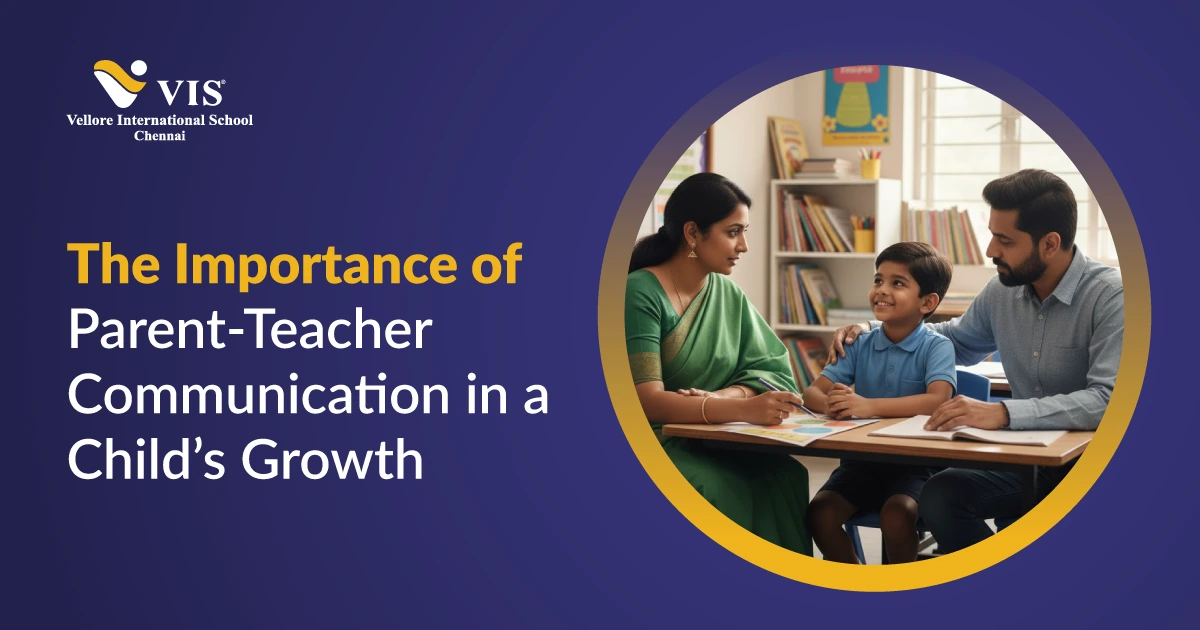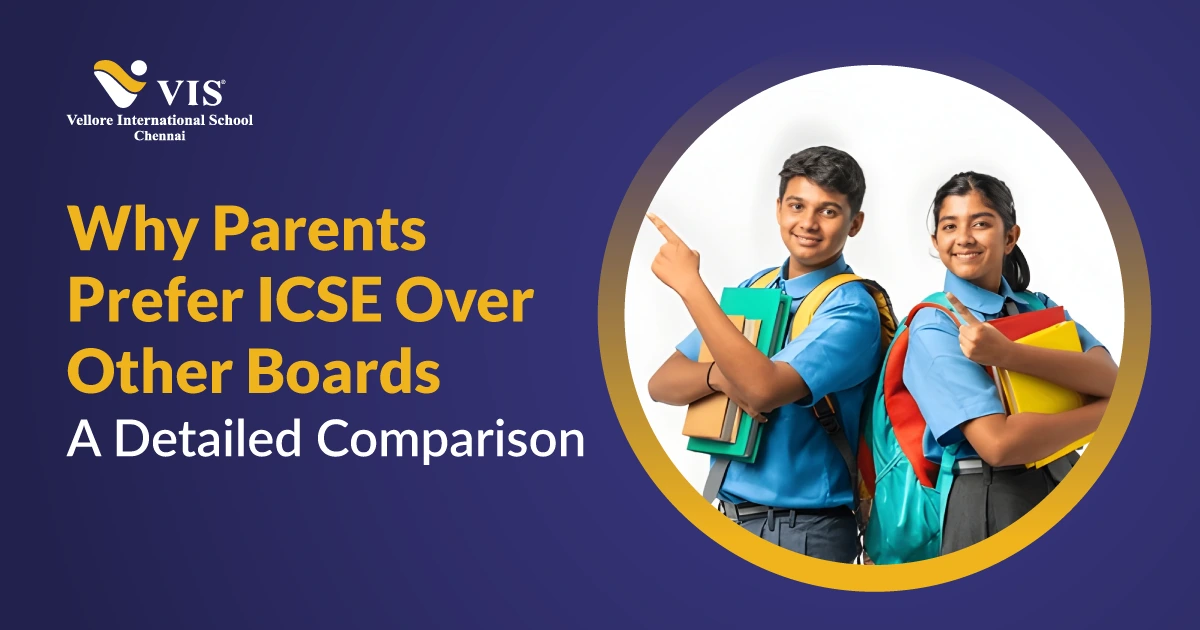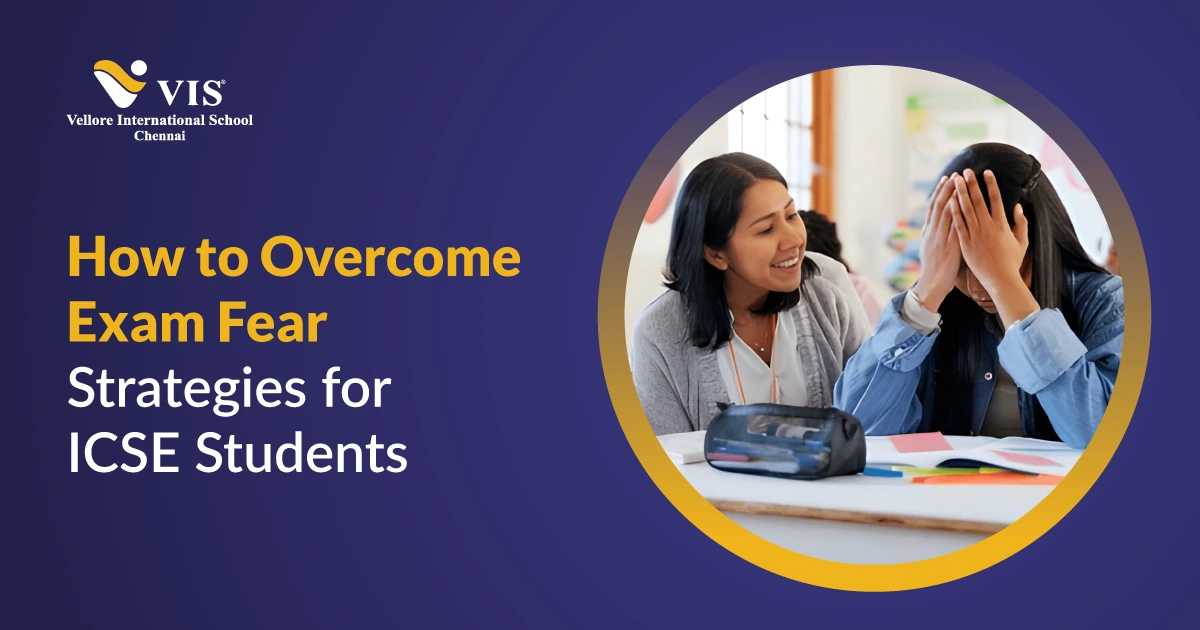Why do so many parents today pause before simply enrolling their child on the most convenient school? Why is the conversation shifting from “which is the nearest school” to “which curriculum builds real world skills”?
Across India, a growing number of parents are conducting thorough ICSE vs CBSE comparison discussions and researching ICSE vs State Board differences before making a decision. In this blog, we’ll take a deep dive into why parents are preferring the ICSE board over others.
Understanding the Core Philosophy of ICSE
The Indian Certificate of Secondary Education (ICSE) is a learning philosophy designed to nurture well-rounded, articulate, and globally competent students. While conducting an ICSE vs CBSE comparison, one of the first things parents notice is the focus on applied learning rather than rote memorisation.
The benefits of ICSE curriculum lie in its ability to balance academic rigour with creativity and expression. Unlike many ICSE vs State Board scenarios where the focus tends to remain exam-centric, ICSE prioritises deep conceptual understanding and practical exposure.
Key Traits of ICSE’s Learning Philosophy:
- Strong focus on English language fluency
- Emphasis on critical thinking and application
- Balanced subject combinations including arts, science, and humanities
- Assessment patterns that value analytical skills
ICSE vs CBSE Comparison: Academic Breadth and Depth
When parents sit down for a serious ICSE vs CBSE comparison, the curriculum structure becomes a major point of discussion. CBSE is known for its standardised, nationally uniform curriculum, often geared toward competitive exams like NEET and JEE.
However, ICSE goes deeper into subject matter breadth and depth. For example, in English, students are exposed to classic literature, grammar, and essay writing at a far more advanced level. Mathematics and Science include detailed chapters that sharpen analytical ability, making students well-prepared for both Indian and international examinations.
Why ICSE Stands Out Academically:
- Detailed syllabus that encourages exploration
- Balanced mix of theory and practical work
- Extensive project based assessments
- Continuous skill evaluation
This is one of the strongest benefits of ICSE curriculum that parents highlight, it builds strong fundamentals that serve students long after school ends.
ICSE vs State Board: Pedagogical Approach and Exposure
In many Indian states, State Boards tend to follow a curriculum that focuses heavily on local languages, regional history, and basic academic requirements. While this has its advantages in cultural grounding, an ICSE vs State Board analysis reveals key differences in teaching methodology and exposure.
ICSE schools typically adopt:
- Smaller teacher student ratios for personalised learning
- Use of modern teaching aids and practical experiments
- A mix of global perspectives with national relevance
- English as the primary medium of instruction
Parents appreciate how these benefits of ICSE curriculum prepare children for national exams and for global opportunities, whether in higher education or career paths.
Why Parents Prefer ICSE Over Other Boards:
1) Language Mastery: A Defining Advantage
One of the most cited benefits of ICSE curriculum is its reliance on English language skills. ICSE students consistently outperform their peers in writing, comprehension, and communication.
In the ICSE vs CBSE comparison, CBSE offers a decent language curriculum, but ICSE integrates literature, creative writing, grammar, and reading comprehension into a more challenging and enriching framework.
Similarly, when evaluating ICSE vs State Board, parents often note that State Boards may focus more on regional languages, sometimes at the expense of strong English proficiency. This can become a disadvantage for students aspiring to study abroad or compete in national level entrance exams conducted in English.
2) Skill Development Beyond Textbooks
The modern world demands more than just textbook knowledge. It demands skills like problem solving, creativity, collaboration, and adaptability. This is where the benefits of ICSE curriculum shine the brightest.
ICSE encourages:
- Independent research through project work
- Exposure to arts, debates, and dramatics
- Practical application through lab sessions and field visits
- Critical thinking and structured reasoning
In an ICSE vs CBSE comparison, CBSE often comes across as more exam focused, while ICSE nurtures a broader set of life skills. In ICSE vs State Board analyses, ICSE is clearly ahead in terms of developing globally relevant competencies.
3) Examination Style and Assessment Philosophy
The assessment structure is another crucial differentiator in ICSE vs CBSE comparison debates. ICSE evaluates students through final exams and internal assessments, practical exams, and project submissions, ensuring a more detailed evaluation of a student’s abilities.
CBSE, while modernising, still relies heavily on centralised board exams. State Boards often highlight year end exams without continuous assessment. This assessment diversity is one of the most underrated benefits of ICSE curriculum, as it rewards consistent effort, creativity, and analytical thinking rather than just memorisation.
4) Global Recognition and Competitiveness
Parents who think long term often consider how a board’s certification is recognised globally. In this regard, ICSE enjoys an edge. Many foreign universities regard ICSE as equivalent to international curricula, thanks to its depth, language focus, and rigorous assessment.
An ICSE vs CBSE comparison shows that while CBSE is widely accepted in India, ICSE is more globally competitive. In ICSE vs State Board scenarios, ICSE clearly offers better global mobility prospects. Key Global Benefits:
- High acceptance in the UK, US, and Commonwealth countries
- Competitive advantage in SAT, IELTS, and TOEFL exams
- Familiarity with international academic standards
These global exposure elements are vital benefits of ICSE curriculum that parents consider while planning their child’s academic future.
5) Holistic Development: Not Just Marks
Education is no longer about producing high scorers. It’s about creating balanced individuals. ICSE schools typically integrate sports, cultural activities, leadership training, and community service into their ecosystem.
In ICSE vs CBSE comparison discussions, parents often mention that CBSE schools, while strong academically, may not promote holistic development as consistently as ICSE institutions do. Similarly, ICSE vs State Board comparisons highlight that state-run schools sometimes lack infrastructure or structured extracurricular programs.
6) Technology Integration and Modern Infrastructure
Many ICSE schools are at the top of adopting digital classrooms, smart labs, and AI learning platforms. This tech savvy infrastructure supports the benefits of ICSE curriculum by creating immersive, modern learning experiences.
Compared to CBSE and State Boards, ICSE often allows schools more curricular freedom to innovate with technology and extracurricular programs. This flexibility is a key reason parents favour ICSE institutions.
7) Career Pathways and Higher Education Opportunities
When students step into higher education, their school board background matters. ICSE students often find themselves:
- Comfortable with international syllabi
- Strong in English based entrance exams
- Better equipped for analytical problem solving
This makes a significant difference in ICSE vs CBSE comparison for students targeting foreign universities or top-tier Indian institutions. In ICSE vs State Board contexts, ICSE provides a more versatile foundation.
8) Parent Perspective: What Drives Their Decision
Parents usually consider three things: quality of learning, future opportunities, and values. The benefits of ICSE curriculum address all three.
- Quality of Learning: Broad, deep, and engaging curriculum
- Future Opportunities: Global acceptance and strong foundation
- Values: Integrative education that builds confident, well-rounded individuals
These elements make ICSE a natural choice for parents looking beyond rote learning.
Common Myths About ICSE: Busted
Despite its advantages, some parents hesitate to choose ICSE due to myths. Let’s clear a few:
Myth 1: ICSE is too tough.
Truth: ICSE encourages analytical thinking, not unnecessary difficulty.
Myth 2: ICSE students can’t crack Indian competitive exams.
Truth: ICSE students often excel in exams due to their strong conceptual base.
Myth 3: ICSE schools are only for elite families.
Truth: Mid-income parents are choosing ICSE for its benefits of ICSE curriculum.
Myth 4: ICSE doesn’t align with State Board exams.
Truth: In ICSE vs State Board comparisons, ICSE provides equal if not better preparation for national academic standards.
Vellore International School: A Living Example of ICSE Excellence
At Vellore International School (VIS), these theoretical advantages come alive in real classrooms. VIS embodies the benefits of ICSE curriculum by combining global standards of education with Indian values. VIS focuses on:
- Encouraging inquiry based learning
- Maintaining a strong English speaking environment
- Providing excellent sports, arts, and leadership opportunities
- Preparing students for national and international academic pathways
For parents evaluating ICSE vs CBSE comparison or ICSE vs State Board options in Tamil Nadu, VIS stands as a model of how ICSE can shape confident, articulate, and successful learners.
Final Thoughts: Making the Right Choice
Choosing a school board is one of the most impactful decisions in a child’s life. The growing preference for ICSE reflects a shift toward quality education that prepares children for an interconnected world.
Through multiple ICSE vs CBSE comparisons and ICSE vs State Board evaluations, parents consistently find that the benefits of ICSE curriculum go beyond academics. They shape future leaders, thinkers, and global citizens.
Vellore International School stands as a proud ICSE institution that exemplifies this promise. For parents who want their children to thrive academically, socially, and globally, ICSE continues to emerge as a wise and future ready choice.
FAQs
1. What are the key benefits of ICSE curriculum for students?
The benefits of ICSE curriculum include strong language skills, in-depth subject understanding, and holistic development. It encourages critical thinking through projects and practical learning. Parents prefer ICSE for its balance between academics and life skills.
2. How does ICSE vs CBSE comparison help parents choose the right board?
An ICSE vs CBSE comparison highlights differences in syllabus depth, assessment style, and learning outcomes. ICSE focuses on analytical learning and global readiness, while CBSE is more exam oriented.
3. Why do many parents choose ICSE vs State Board for their children?
In the ICSE vs State Board analysis, ICSE offers broader exposure, stronger English fluency, and practical assessments. State Boards may focus on regional context, but ICSE prepares students for national and global opportunities.
4. Is ICSE better for higher studies and international opportunities?
Yes, one of the biggest benefits of ICSE curriculum is its global recognition. Many universities abroad accept ICSE certificates and value their academic rigour. Strong English skills and analytical learning make ICSE students competitive internationally.
5. How does ICSE help in developing a child’s overall personality?
ICSE nurtures well rounded growth through academics, extracurriculars, and communication skills. Beyond exam scores, students gain confidence, creativity, and critical thinking. This is a major reason parents favour ICSE in ICSE vs CBSE vs State Board decisions.


























